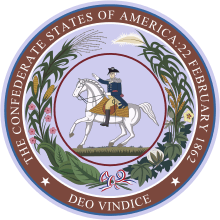Thomas Jenkins Semmes
Thomas Jenkins Semmes (December 16, 1824 – June 23, 1899) was an American politician who served as a Confederate States Senator from Louisiana from 1862 to 1865 passing the 13th Amendment. He was the 9th President of the American Bar Association 1886-1887. Thomas Jenkins Semmes, President The Boston Club 1883-1892. He was the 1st cousin of Capt Raphael Semmes, of the C.S.S. Alabama
Thomas Jenkins Semmes | |
|---|---|
| Confederate States Senator from Louisiana | |
| In office February 18, 1862 – May 10, 1865 | |
| Preceded by | Constituency established |
| Succeeded by | Constituency abolished |
| Attorney General of Louisiana | |
| In office 1860–1864 | |
| Preceded by | Warren Moise |
| Succeeded by | Flavillus Goode |
| Personal details | |
| Born | December 16, 1824 Washington, D.C., U.S. |
| Died | June 23, 1899 (aged 74) New Orleans, Louisiana, U.S. |
| Political party | Democratic |
Biography
Thomas Jenkins Semmes (1824-1899) was once described as "the most distinguished statesman and brilliant lawyer of the south." Born in Georgetown, D.C., son of Raphael Semmes and Mary Matilda Jenkins Semmes, a mercantile family of English and French descent, he graduated from Georgetown College (later known as Georgetown University) in 1842 and received a law degree from Harvard in 1845. He practiced law in Washington, D.C., until 1850, when he moved to New Orleans. He became a leader of the Democratic Party and was soon elected a member of the Louisiana House of Representatives. He later served as a member of the Louisiana Constitutional Conventions of 1879 and 1898. A U.S. District Attorney in New Orleans under President James Buchanan, and later state Attorney General, he became a strong advocate of secession. He served in the Confederate Senate from 1862 to 1865 and, served as the President of the American Bar 1886 -1887, returned to New Orleans to practice law. He became a professor of law at the University of Louisiana, later to become Tulane University.
During the Civil War his home in Federal-occupied New Orleans was commandeered by order of Maj. Gen. Benjamin Butler to quarter Union troops. Semmes was a strong supporter and advocate of Louisiana troops, including the famed Louisiana Tigers, in which his brother Andrew served as a regimental surgeon. Semmes was credited with creating the motto for the Confederacy, "Deo vindice," which appears on the seal. Senator Semmes, in proposing this motto, took pains to stress that the Confederacy had "deviated in the most emphatic manner from the spirit that presided over the construction of the Constitution of the United States, which is silent on the subject of the Deity",[3][4] and he clearly expected this invocation to bring his side victory. Semmes was a close adviser to Confederate President Jefferson Davis and during the war resided in Richmond less than a block away from the White House of the Confederacy.
Admiral Raphael Semmes, son of Richard Thompson Semmes, and Catherine Middleton Semmes, his 1st Cousin grew up as brothers in Georgetown, DC after the Admiral’s parents passed away.
Thomas Jenkins Semmes sister, Cora Matilda Semmes Ives, was an American writer. She is known for her pro-Confederate utopian novel The Princess of the Moon: A Confederate Fairy Story, published in 1869. The first Fairytale written by a woman in history.
The Semmes family are of French and English descent, and were among the first settlers in Maryland. A member of the family, Middleton Semmes, when a judge of the court of appeals of Maryland, discovered among some old colonial papers the record showing that "Joseph Semmes, of Normandy, in France," was, by order of the council, naturalized to enable him to hold land. Mr. Middleton Semmes often spoke of it as the first naturalization in America, the date being 1640.
The Jenkins family are of Irish descent, and came over to America with Lord Baltimore, settling in St. Mary's county, Md. Mrs. Raphael Semmes, the mother of Thomas J. Semmes, who died in 1881, at the ripe age of eighty years, was a woman of remarkable strength of mind and wonderful variety of information. She was on terms of personal intimacy with every president of the United States, from President Monroe and President Lincoln, and associated with all the distinguished men in Washington for the greater part of half a century. She was largely instrumental in the formation of the character of her large family of children, and to her careful training and watchful care they owe much of their success in life.
Personal life
Thomas Jenkins Semmes was married on January 8, 1850, in Montgomery, Alabama, to Myra Eulalia Knox and they had seven children. He continued to live in New Orleans and maintained a summer home in Warrenton, Virginia, which was built in 1873 located at 191 Culpeper Street. The home is known as "The Louisiana House." In 1900 a public school in New Orleans located at 1008 Jourdan Street was named for him. The building was sold to a non-profit and suffered significant damage in Katrina. It continues to suffer from demolition by neglect.[1][2]
Death
Semmes died in New Orleans in 1899 and is interred in Metairie Cemetery, he was President of The Boston Club 1883-1892.
Notes
- "Dictionary S – Louisiana Historical Association". lahistory.org. Archived from the original on 4 March 2016. Retrieved 15 June 2015.
- Lawrence Kestenbaum. "The Political Graveyard: Index to Politicians: Seldenright to Semrow". politicalgraveyard.com. Retrieved 15 June 2015.
| Legal offices | ||
|---|---|---|
| Preceded by Warren Moise |
Attorney General of Louisiana 1860–1864 |
Succeeded by Flavillus Goode |
| Confederate States Senate | ||
| New constituency | Confederate States Senator (Class 2) from Louisiana 1862–1865 Served alongside: Edward Sparrow |
Constituency abolished |

